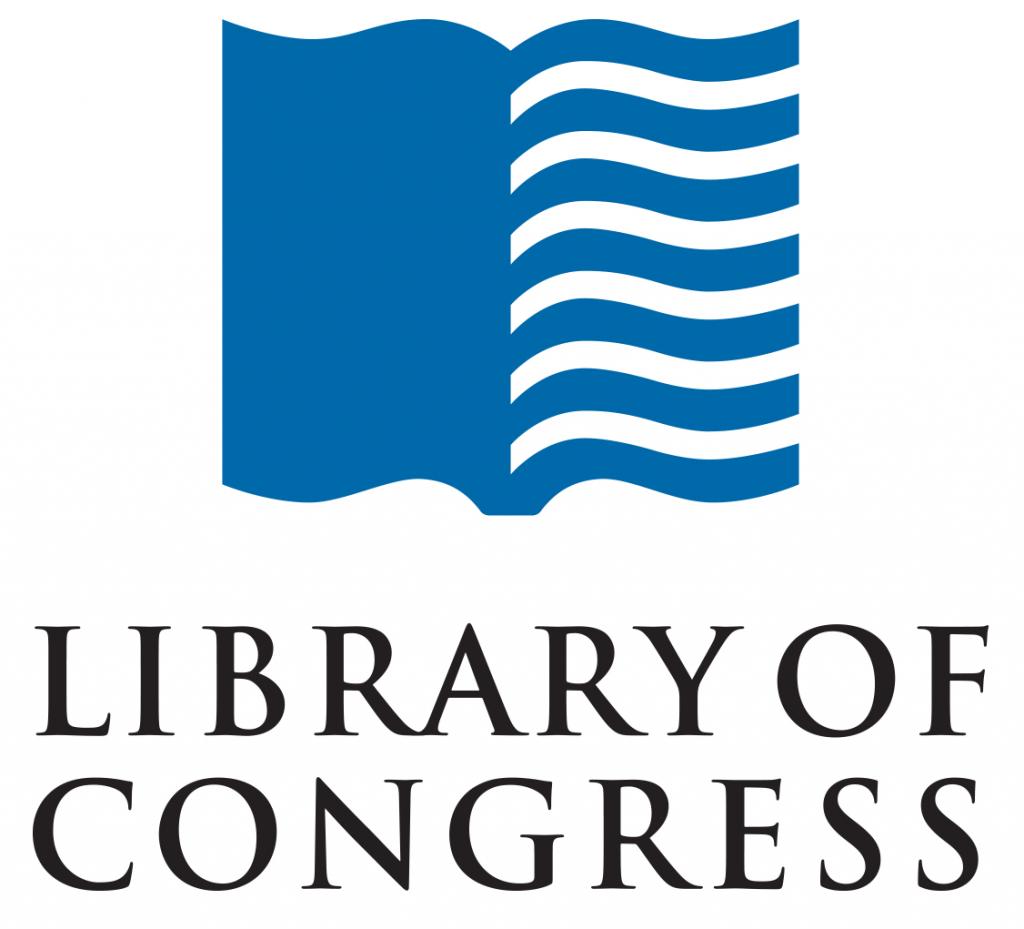from May. 13, 1865
President Lincoln's Funeral Procession in New York City
-
Full Title
President Lincoln's Funeral Procession in New York City - Frank Leslie's Illustrated Newspaper Drawing
-
Description
In the May 13th, 1865 edition of Frank Leslie's Illustrated Weekly newspaper, this image was printed next to an article about President Lincoln's funeral train heading to Springfield, Illinois for burial. The train carrying Lincoln’s body traveled through 180 cities and seven states on its way to Springfield. Scheduled stops for the special funeral train were published in newspapers. In ten cities, Lincoln’s casket was removed from the train for elaborate memorial services and public viewings. This image depicts the funeral procession for President Lincoln in New York City. It states that a million people came out to see the president. The illustrated literary and news publication was founded in 1855 and continued until 1922. It was one of several started by publisher and illustrator Frank Leslie. Leslie was a British engraver who came to the United States in 1848. The Illustrated Weekly followed a tested and proven formula of carefully combining elements of war, politics, art, science, travel and exploration, literature and the fine arts in each issue, enhanced with between 16 and 32 illustrations. By 1897 its circulation had grown to an estimated 65,000 copies.
-
Source
Lincoln Financial Foundation Collection
-
Rights
To request rights and permissions to use Lincoln Financial Foundation Collection images in research or publications, please download our image rights permission form: https://www.lincolncollection.org/access/image-rights-permissions/.
-
Tags
-
Cite this Item
Frank Leslie. "President Lincoln's Funeral Procession in New York City - Frank Leslie's Illustrated Newspaper Drawing". Frank Leslie. Remembering Lincoln. Web. Accessed December 15, 2025. https://rememberinglincoln.fords.org/node/1114
-
Creator
Frank Leslie
-
Publisher
Frank Leslie
-
Date
May 13, 1865
from May. 13, 1865
President Lincoln's Funeral Procession in New York City - Frank Leslie's Illustrated Newspaper Drawing

-
Description
In the May 13th, 1865 edition of Frank Leslie's Illustrated Weekly newspaper, this image was printed next to an article about President Lincoln's funeral train heading to Springfield, Illinois for burial. The train carrying Lincoln’s body traveled through 180 cities and seven states on its way to Springfield. Scheduled stops for the special funeral train were published in newspapers. In ten cities, Lincoln’s casket was removed from the train for elaborate memorial services and public viewings. This image depicts the funeral procession for President Lincoln in New York City. It states that a million people came out to see the president. The illustrated literary and news publication was founded in 1855 and continued until 1922. It was one of several started by publisher and illustrator Frank Leslie. Leslie was a British engraver who came to the United States in 1848. The Illustrated Weekly followed a tested and proven formula of carefully combining elements of war, politics, art, science, travel and exploration, literature and the fine arts in each issue, enhanced with between 16 and 32 illustrations. By 1897 its circulation had grown to an estimated 65,000 copies.
-
Source
Lincoln Financial Foundation Collection
-
Rights
To request rights and permissions to use Lincoln Financial Foundation Collection images in research or publications, please download our image rights permission form: https://www.lincolncollection.org/access/image-rights-permissions/.
-
Creator
Frank Leslie
-
Publisher
Frank Leslie
-
Date
May 13, 1865
from May. 13, 1865
President Lincoln's Funeral Train on a Steamer
-
Full Title
President Lincoln's Funeral Train on a Steamer - Frank Leslie's Illustrated Newspaper Drawing
-
Description
In the May 13th, 1865 edition of Frank Leslie's Illustrated Weekly newspaper, this image was printed next to an article about President Lincoln's funeral train heading to Springfield, Illinois for burial. The train carrying Lincoln’s body traveled through 180 cities and seven states on its way to Springfield. Scheduled stops for the special funeral train were published in newspapers. In ten cities, Lincoln’s casket was removed from the train for elaborate memorial services and public viewings. Millions of Americans came out to see the president and pay respects. The illustrated literary and news publication was founded in 1855 and continued until 1922. It was one of several started by publisher and illustrator Frank Leslie. Leslie was a British engraver who came to the United States in 1848. The Illustrated Weekly followed a tested and proven formula of carefully combining elements of war, politics, art, science, travel and exploration, literature and the fine arts in each issue, enhanced with between 16 and 32 illustrations. By 1897 its circulation had grown to an estimated 65,000 copies.
-
Source
Lincoln Financial Foundation Collection
-
Rights
To request rights and permissions to use Lincoln Financial Foundation Collection images in research or publications, please download our image rights permission form: https://www.lincolncollection.org/access/image-rights-permissions/.
-
Tags
-
Cite this Item
Frank Leslie. "President Lincoln's Funeral Train on a Steamer - Frank Leslie's Illustrated Newspaper Drawing". Frank Leslie. Remembering Lincoln. Web. Accessed December 15, 2025. https://rememberinglincoln.fords.org/node/1113
-
Creator
Frank Leslie
-
Publisher
Frank Leslie
-
Date
May 13, 1865
from May. 13, 1865
President Lincoln's Funeral Train on a Steamer - Frank Leslie's Illustrated Newspaper Drawing
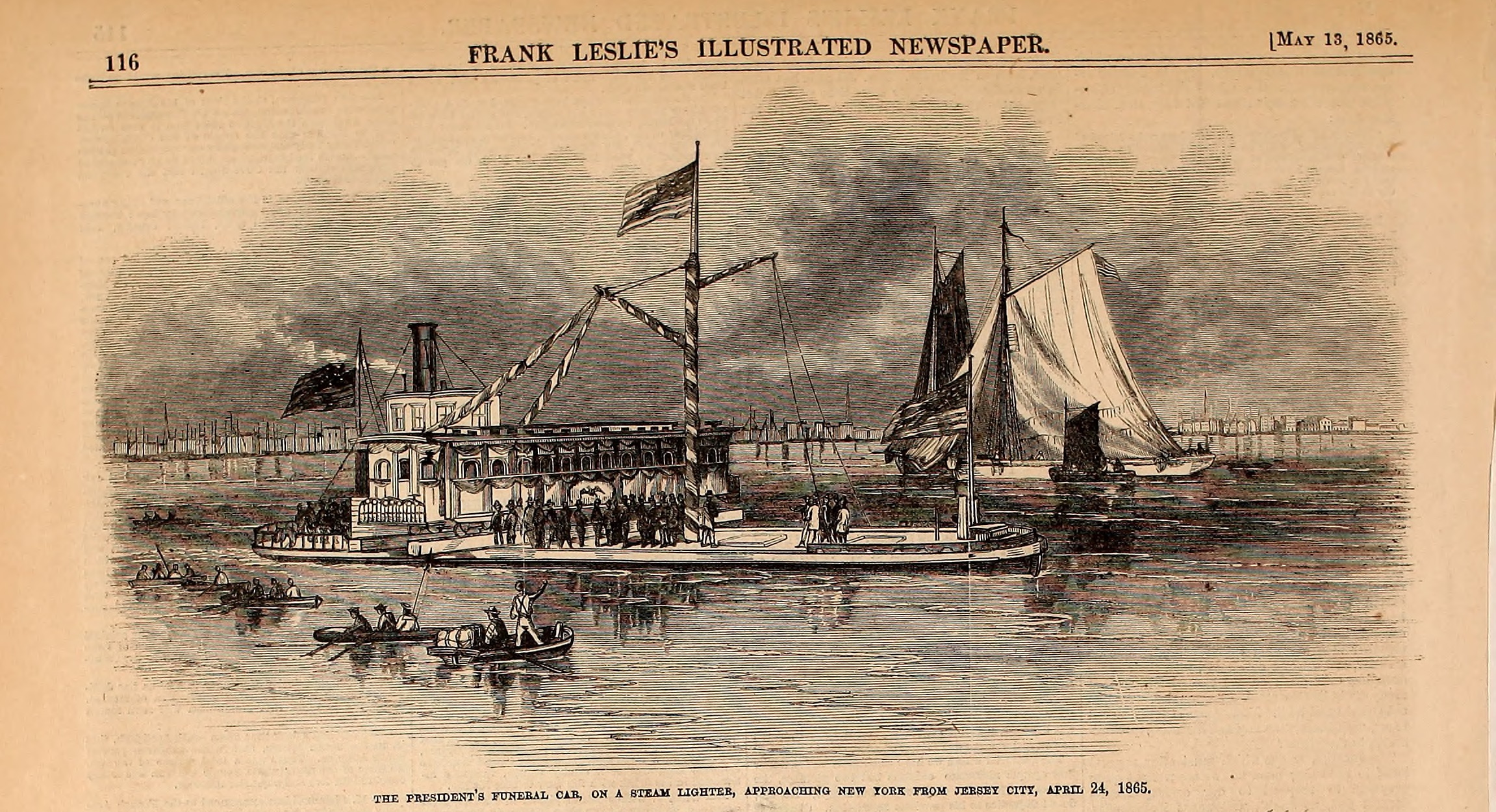
-
Description
In the May 13th, 1865 edition of Frank Leslie's Illustrated Weekly newspaper, this image was printed next to an article about President Lincoln's funeral train heading to Springfield, Illinois for burial. The train carrying Lincoln’s body traveled through 180 cities and seven states on its way to Springfield. Scheduled stops for the special funeral train were published in newspapers. In ten cities, Lincoln’s casket was removed from the train for elaborate memorial services and public viewings. Millions of Americans came out to see the president and pay respects. The illustrated literary and news publication was founded in 1855 and continued until 1922. It was one of several started by publisher and illustrator Frank Leslie. Leslie was a British engraver who came to the United States in 1848. The Illustrated Weekly followed a tested and proven formula of carefully combining elements of war, politics, art, science, travel and exploration, literature and the fine arts in each issue, enhanced with between 16 and 32 illustrations. By 1897 its circulation had grown to an estimated 65,000 copies.
-
Source
Lincoln Financial Foundation Collection
-
Rights
To request rights and permissions to use Lincoln Financial Foundation Collection images in research or publications, please download our image rights permission form: https://www.lincolncollection.org/access/image-rights-permissions/.
-
Creator
Frank Leslie
-
Publisher
Frank Leslie
-
Date
May 13, 1865
from Jun. 10, 1865
The Funeral Catafalque at Springfield, Illinois
-
Full Title
The Funeral Catafalque at Springfield, Illinois - Frank Leslie's Illustrated Newspaper Drawing
-
Description
In the June 10th, 1865 edition of Frank Leslie's Illustrated Weekly newspaper, this image was printed next to an article about President Lincoln's funeral in Springfield, Illinois. It shows mourners visiting Lincoln's coffin before burial. President Lincoln was buried on May 4, 1865 at Oak Ridge Cemetery. The illustrated literary and news publication was founded in 1855 and continued until 1922. It was one of several started by publisher and illustrator Frank Leslie. Leslie was a British engraver who came to the United States in 1848. The Illustrated Weekly followed a tested and proven formula of carefully combining elements of war, politics, art, science, travel and exploration, literature and the fine arts in each issue, enhanced with between 16 and 32 illustrations. By 1897 its circulation had grown to an estimated 65,000 copies.
-
Source
Lincoln Financial Foundation Collection
-
Rights
To request rights and permissions to use Lincoln Financial Foundation Collection images in research or publications, please download our image rights permission form: https://www.lincolncollection.org/access/image-rights-permissions/.
-
Tags
-
Cite this Item
Thomas Hogan. "The Funeral Catafalque at Springfield, Illinois - Frank Leslie's Illustrated Newspaper Drawing". Frank Leslie. Remembering Lincoln. Web. Accessed December 15, 2025. https://rememberinglincoln.fords.org/node/1112
-
Creator
Thomas Hogan
-
Publisher
Frank Leslie
-
Date
June 10, 1865
from Jun. 10, 1865
The Funeral Catafalque at Springfield, Illinois - Frank Leslie's Illustrated Newspaper Drawing
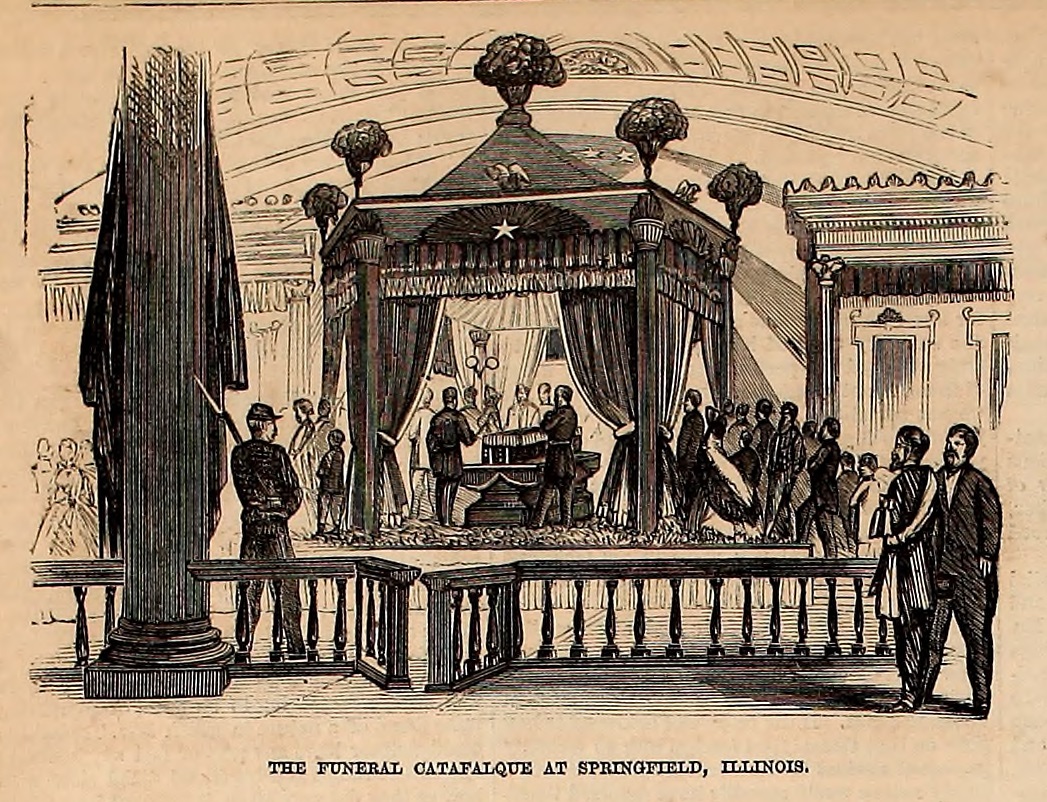
-
Description
In the June 10th, 1865 edition of Frank Leslie's Illustrated Weekly newspaper, this image was printed next to an article about President Lincoln's funeral in Springfield, Illinois. It shows mourners visiting Lincoln's coffin before burial. President Lincoln was buried on May 4, 1865 at Oak Ridge Cemetery. The illustrated literary and news publication was founded in 1855 and continued until 1922. It was one of several started by publisher and illustrator Frank Leslie. Leslie was a British engraver who came to the United States in 1848. The Illustrated Weekly followed a tested and proven formula of carefully combining elements of war, politics, art, science, travel and exploration, literature and the fine arts in each issue, enhanced with between 16 and 32 illustrations. By 1897 its circulation had grown to an estimated 65,000 copies.
-
Source
Lincoln Financial Foundation Collection
-
Rights
To request rights and permissions to use Lincoln Financial Foundation Collection images in research or publications, please download our image rights permission form: https://www.lincolncollection.org/access/image-rights-permissions/.
-
Creator
Thomas Hogan
-
Publisher
Frank Leslie
-
Date
June 10, 1865
from Jun. 10, 1865
Mourners at Abraham Lincoln's Funeral in Springfield, IL
-
Full Title
Mourners at Abraham Lincoln's Funeral in Springfield, IL - Frank Leslie's Illustrated Newspaper Drawing
-
Description
In the June 10th, 1865 edition of Frank Leslie's Illustrated Weekly newspaper, this image was printed next to an article about President Lincoln's funeral in Springfield, Illinois. It shows President Lincoln's eldest son, Robert, at his tomb and others raising money to build a memorial to President Lincoln. President Lincoln was buried on May 4, 1865 at Oak Ridge Cemetery. The illustrated literary and news publication was founded in 1855 and continued until 1922. It was one of several started by publisher and illustrator Frank Leslie. Leslie was a British engraver who came to the United States in 1848. The Illustrated Weekly followed a tested and proven formula of carefully combining elements of war, politics, art, science, travel and exploration, literature and the fine arts in each issue, enhanced with between 16 and 32 illustrations. By 1897 its circulation had grown to an estimated 65,000 copies.
-
Source
The Lincoln Financial Foundation Collection
-
Rights
To request rights and permissions to use Lincoln Financial Foundation Collection images in research or publications, please download our image rights permission form: https://www.lincolncollection.org/access/image-rights-permissions/.
-
Tags
-
Cite this Item
Thomas Hogan. "Mourners at Abraham Lincoln's Funeral in Springfield, IL - Frank Leslie's Illustrated Newspaper Drawing". Frank Leslie. Remembering Lincoln. Web. Accessed December 15, 2025. https://rememberinglincoln.fords.org/node/1111
-
Creator
Thomas Hogan
-
Publisher
Frank Leslie
-
Date
June 10, 1865
from Jun. 10, 1865
Mourners at Abraham Lincoln's Funeral in Springfield, IL - Frank Leslie's Illustrated Newspaper Drawing
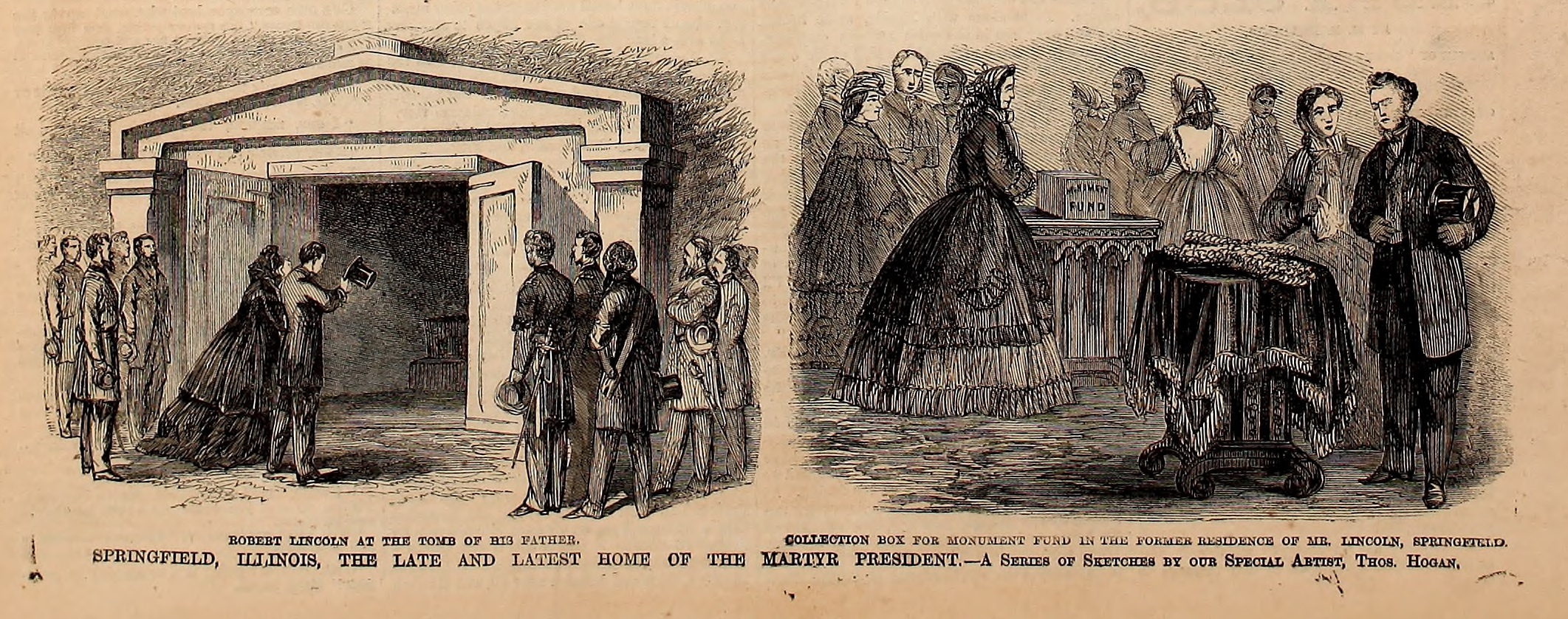
-
Description
In the June 10th, 1865 edition of Frank Leslie's Illustrated Weekly newspaper, this image was printed next to an article about President Lincoln's funeral in Springfield, Illinois. It shows President Lincoln's eldest son, Robert, at his tomb and others raising money to build a memorial to President Lincoln. President Lincoln was buried on May 4, 1865 at Oak Ridge Cemetery. The illustrated literary and news publication was founded in 1855 and continued until 1922. It was one of several started by publisher and illustrator Frank Leslie. Leslie was a British engraver who came to the United States in 1848. The Illustrated Weekly followed a tested and proven formula of carefully combining elements of war, politics, art, science, travel and exploration, literature and the fine arts in each issue, enhanced with between 16 and 32 illustrations. By 1897 its circulation had grown to an estimated 65,000 copies.
-
Source
The Lincoln Financial Foundation Collection
-
Rights
To request rights and permissions to use Lincoln Financial Foundation Collection images in research or publications, please download our image rights permission form: https://www.lincolncollection.org/access/image-rights-permissions/.
-
Creator
Thomas Hogan
-
Publisher
Frank Leslie
-
Date
June 10, 1865
from May. 13, 1865
President Lincoln's funeral
-
Full Title
President Lincoln's funeral. [Harper's Weekly illustration.]
-
Description
This illustration from Harper's Weekly depicts the funeral procession of Abraham Lincoln in an issue published on May 13, 1865. Guided by Union Soldiers on all sides, Lincoln's body is processed through the crowded streets of New York City as onlookers gather to see their beloved President. In the center of the illustration, a balcony is adorned with a banner that reads "WITH MALICE TOWARD NONE, WITH CHARITY FOR ALL," referring to Lincoln's Second Inaugural Address on March 4, 1865.
-
Source
Library of Congress, Rare Book and Special Collections Division, Alfred Whital Stern Collection of Lincolniana.
-
Rights
This item is in the public domain and may be reproduced and used for any purpose, including research, teaching, private study, publication, broadcast or commercial use, with proper citation and attribution.
-
Tags
-
Cite this Item
Mathew Brady. "President Lincoln's funeral. [Harper's Weekly illustration.]". Harper's Weekly. Remembering Lincoln. Web. Accessed December 15, 2025. https://rememberinglincoln.fords.org/node/1104
from May. 13, 1865
President Lincoln's funeral. [Harper's Weekly illustration.]
![President Lincoln's funeral. [Harper's Weekly illustration.]](https://rememberinglincoln.fords.org/sites/default/files/001r%5B1%5D.png)
-
Description
This illustration from Harper's Weekly depicts the funeral procession of Abraham Lincoln in an issue published on May 13, 1865. Guided by Union Soldiers on all sides, Lincoln's body is processed through the crowded streets of New York City as onlookers gather to see their beloved President. In the center of the illustration, a balcony is adorned with a banner that reads "WITH MALICE TOWARD NONE, WITH CHARITY FOR ALL," referring to Lincoln's Second Inaugural Address on March 4, 1865.
-
Source
Library of Congress, Rare Book and Special Collections Division, Alfred Whital Stern Collection of Lincolniana.
-
Rights
This item is in the public domain and may be reproduced and used for any purpose, including research, teaching, private study, publication, broadcast or commercial use, with proper citation and attribution.
-
Creator
Mathew Brady
-
Publisher
Harper's Weekly
-
Date
May 13, 1865
-
Material
newspaper
-
Dimensions
40.1 x 55.7 cm.
from Apr. 14, 1865
Silas H. Billings Diary
-
Full Title
Silas H. Billings Diary
-
Description
Silas H. Billings was a U.S. Army soldier from Lafayette, New York, wounded at the Battle of Winchester in September 1864. In April 1865 he was a patient at Saterlee Hospital in Philadelphia, Pennsylvania, when he learned that John Wilkes Booth had assassinated President Abraham Lincoln. Billings then received permission to attend Lincoln's funeral in Philadelphia. Like many people at the time, Billings recorded both newsworthy events, like Lincoln's assassination, and the details of his everyday life together. After the Civil War, Billings became a school teacher and part-time farmhand. His wounds led to his death in 1873, at the age of only 30.
-
Transcription
[inside cover]
Silas H. Billings
Wounded at
Winchester Va
Sept 19 1864
[Friday, April 14, 1865]
Abraham Lincoln
is Shot at Fords
Theatre at 9,30 p m and dies at 722 am
Wm H & Fred Seward are stabbed at or
about the same time
[Saturday, April 15, 1865]
my eye is very bad
[Wednesday, April 19, 1865]
Funeral of our Chief
Abraham Lincoln
President of the
U S of America
Recd a Visit from
C F Falch co. "D" 9 ny
Ward 2 Turners Lane
[Saturday, April, 22, 1865]
Recd a pass 2 pm to 9 pm
went downtown to Corner
of Broad & Prime Sts
Funeral Train of the
late President A Lincoln
arrives at 4,30 pm
Procession is formed in
Broad & goes down to
Walnut up to 21st
down to Vine down to
2nd up to Chesnut to
Independence Hall on
Chesnut between 5th & 6th
-
Source
Marjorie Billings Martinez, great-granddaughter of Silas H. Billings
-
Rights
This item may be reproduced and used for any purpose, including research, teaching, private study, publication, broadcast or commercial use, with proper citation and attribution.
-
Tags
-
Cite this Item
Silas H. Billings. "Silas H. Billings Diary". Remembering Lincoln. Web. Accessed December 15, 2025. https://rememberinglincoln.fords.org/node/1040
-
Creator
Silas H. Billings
-
Date
April 14, 1865
from Apr. 14, 1865
Silas H. Billings Diary
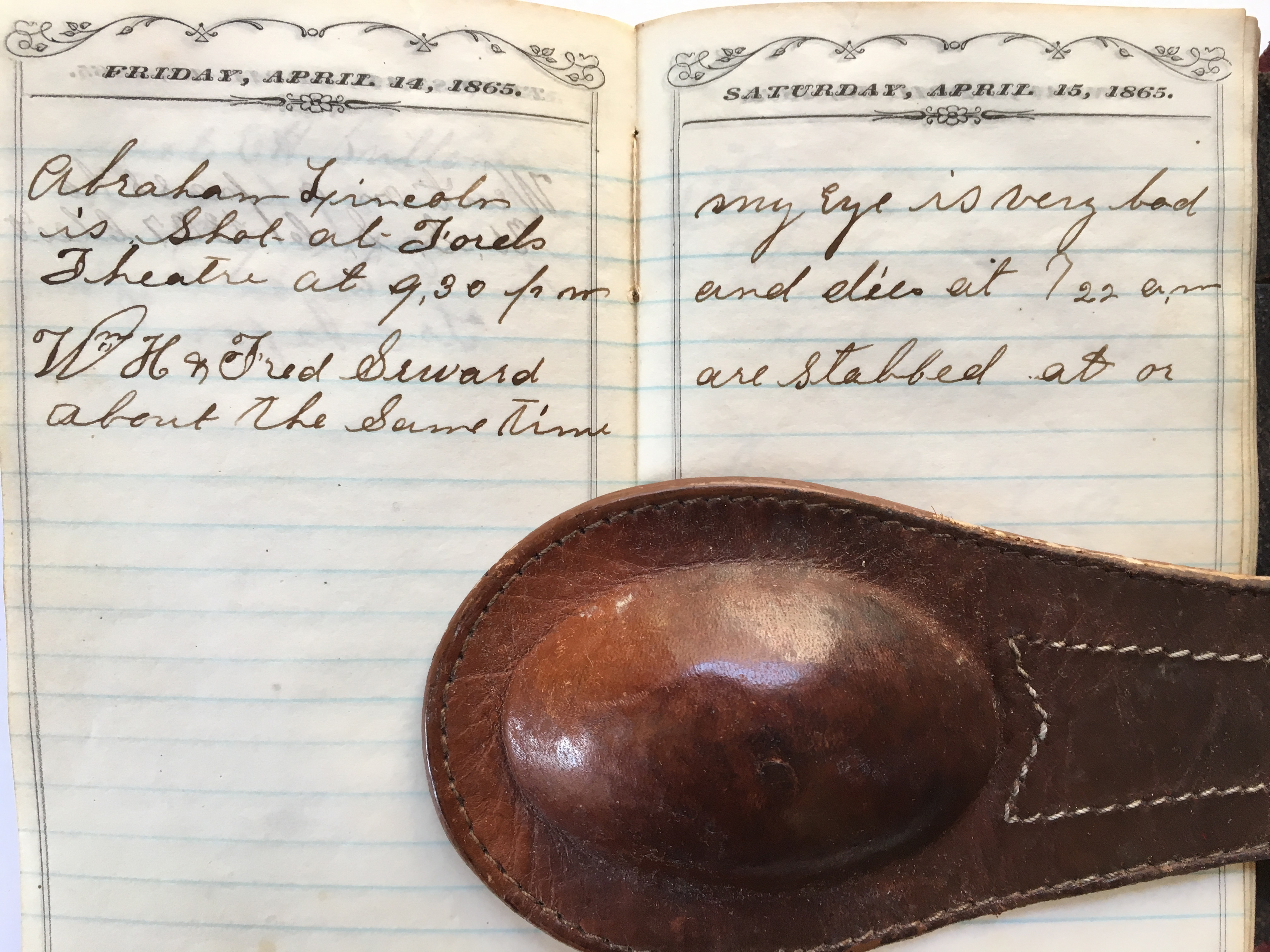
-
Description
Silas H. Billings was a U.S. Army soldier from Lafayette, New York, wounded at the Battle of Winchester in September 1864. In April 1865 he was a patient at Saterlee Hospital in Philadelphia, Pennsylvania, when he learned that John Wilkes Booth had assassinated President Abraham Lincoln. Billings then received permission to attend Lincoln's funeral in Philadelphia. Like many people at the time, Billings recorded both newsworthy events, like Lincoln's assassination, and the details of his everyday life together. After the Civil War, Billings became a school teacher and part-time farmhand. His wounds led to his death in 1873, at the age of only 30.
-
Source
Marjorie Billings Martinez, great-granddaughter of Silas H. Billings
-
Rights
This item may be reproduced and used for any purpose, including research, teaching, private study, publication, broadcast or commercial use, with proper citation and attribution.
-
Creator
Silas H. Billings
-
Date
April 14, 1865
from May. 1, 1865
Lincoln's funeral march
-
Full Title
Lincoln's funeral march
-
Description
Funeral march composed for solo piano. The composer is associated with the Union side. Davis dedicated to work "to the memory of the pure & noble patriot Abraham Lincoln 16th President of the U.S."
-
Source
-
Rights
Public Domain. Suggested credit line: Civil War Sheet Music Collection, Library of Congress, Music Division.
-
Tags
-
Cite this Item
Davis, E. C.. "Lincoln's funeral march". St. Louis: Balmer & Weber, 1865. Remembering Lincoln. Web. Accessed December 15, 2025. https://rememberinglincoln.fords.org/node/1026
from May. 1, 1865
Lincoln's funeral march

-
Description
Funeral march composed for solo piano. The composer is associated with the Union side. Davis dedicated to work "to the memory of the pure & noble patriot Abraham Lincoln 16th President of the U.S."
-
Source
-
Rights
Public Domain. Suggested credit line: Civil War Sheet Music Collection, Library of Congress, Music Division.
-
Creator
Davis, E. C.
-
Publisher
St. Louis: Balmer & Weber, 1865
-
Date
May 1, 1865
-
Material
Sheet Music
from May. 1, 1866
Funeral Dirge of President Lincoln
-
Full Title
Funeral Dirge of President Lincoln
-
Description
Funeral dirge composed in honor of Abraham Lincoln's funeral. Composed for solo piano. Part of the Library of Congress Civil War Sheet Music Collection.
-
Source
-
Rights
Public Domain. Suggested credit line: Civil War Sheet Music Collection, Library of Congress, Music Division.
-
Tags
-
Cite this Item
Rynder, Rose. "Funeral Dirge of President Lincoln". Philadelphia: Marsh & Bubna, 1866. Remembering Lincoln. Web. Accessed December 15, 2025. https://rememberinglincoln.fords.org/node/1023
from May. 1, 1866
Funeral Dirge of President Lincoln

-
Description
Funeral dirge composed in honor of Abraham Lincoln's funeral. Composed for solo piano. Part of the Library of Congress Civil War Sheet Music Collection.
-
Source
-
Rights
Public Domain. Suggested credit line: Civil War Sheet Music Collection, Library of Congress, Music Division.
-
Creator
Rynder, Rose
-
Publisher
Philadelphia: Marsh & Bubna, 1866
-
Date
May 1, 1866
from May. 1, 1865
Abraham Lincoln's funeral march
-
Full Title
Abraham Lincoln's funeral march
-
Description
Slow march based on Abraham Lincoln's funeral, associated with the Union side. Composed for solo piano. Part of the Library of Congress Civil War Sheet Music Collection.
-
Source
-
Rights
Public Domain. Suggested credit line: Civil War Sheet Music Collection, Library of Congress, Music Division.
-
Tags
-
Cite this Item
Bach, C. H. . "Abraham Lincoln's funeral march". Milwaukee, WI: H. N. Hempsted, 1865. Remembering Lincoln. Web. Accessed December 15, 2025. https://rememberinglincoln.fords.org/node/1022
from May. 1, 1865
Abraham Lincoln's funeral march

-
Description
Slow march based on Abraham Lincoln's funeral, associated with the Union side. Composed for solo piano. Part of the Library of Congress Civil War Sheet Music Collection.
-
Source
-
Rights
Public Domain. Suggested credit line: Civil War Sheet Music Collection, Library of Congress, Music Division.
-
Creator
Bach, C. H.
-
Publisher
Milwaukee, WI: H. N. Hempsted, 1865
-
Date
May 1, 1865
-
Material
Sheet Music
from Apr. 23, 1865
Diary Entry: Lincoln Lying in State at Independence Hall
-
Full Title
Thomas Stewardson, Jr. Diary Entry: Lincoln Lying in State at Independence Hall
-
Description
This photocopy displays two pages from the diary of Thomas Stewardson, Jr. Stewardson, a member of The Union League of Philadelphia, recorded his experience viewing President Lincoln's body while lying in state at Independence Hall.
-
Transcription
Sunday April 23rd – The Union League was appointed to receive the body of our good President last Eve’g, at Independence Square. As a member of the League I was in a manner obliged to look for a moment upon the face of the honoured dead. I say obliged, because I [should not?], otherwise have made any effort to do so, my impressions of the Man being so pleasant that I feared to disturb my memory with any possible disappointment. But it turned out well. Homely in feature he was, as all the world knows, but a better face and a face which more clearly told of a good man. I never looked upon, even as it lay there lifeless. Gentle and tender, honest, open, pure. I feel, as nearly every man, woman, and child does feel, a personal and warm love for the man as well as an exalted respect for the ruler, [never?] saw him living, though I have had several opportunities to do so – Such universal sorrow never followed any one to his grave in this country, since the days of Washington, and there was another deep feeling (which happily Washington’s death did not demand) which made most intense the emotions of the mourners of Abraham Lincoln. The good and now murdered, martyred Lincoln! Well, so it had to be, but if that stab has not struck Slavery the death blow, through the body of the Great Emancipator, then possibly Lincoln had died in vain, which [it were?] treason against God’s Providence to believe.
He is now lying in Independence Hall, near the famous old Bell with its motto made to speak again “Proclaim Liberty throughout the land, and to all the Inhabitants thereof.”
-
Source
The Abraham Lincoln Foundation of The Union League of Philadelphia (Object ID: XI.2.1973.2)
-
Rights
Use of this item for research, teaching and private study is permitted with proper citation and attribution, as “Courtesy of The Abraham Lincoln Foundation of The Union League of Philadelphia.” Reproduction of this item for publication, broadcast or commercial use requires written permission. For permission, please contact The Abraham Lincoln Foundation.
-
Tags
-
Cite this Item
Thomas Stewardson, Jr.. "Thomas Stewardson, Jr. Diary Entry: Lincoln Lying in State at Independence Hall". Remembering Lincoln. Web. Accessed December 15, 2025. https://rememberinglincoln.fords.org/node/1013
from Apr. 23, 1865
Thomas Stewardson, Jr. Diary Entry: Lincoln Lying in State at Independence Hall
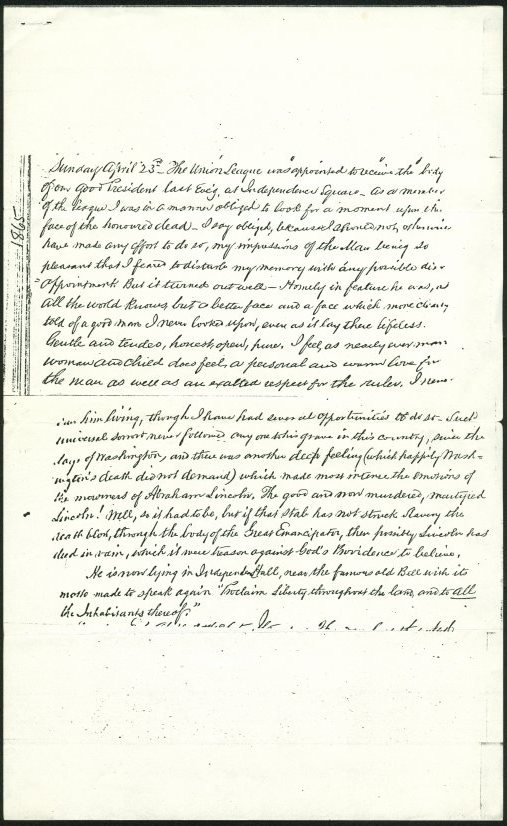
-
Description
This photocopy displays two pages from the diary of Thomas Stewardson, Jr. Stewardson, a member of The Union League of Philadelphia, recorded his experience viewing President Lincoln's body while lying in state at Independence Hall.
-
Source
The Abraham Lincoln Foundation of The Union League of Philadelphia (Object ID: XI.2.1973.2)
-
Rights
Use of this item for research, teaching and private study is permitted with proper citation and attribution, as “Courtesy of The Abraham Lincoln Foundation of The Union League of Philadelphia.” Reproduction of this item for publication, broadcast or commercial use requires written permission. For permission, please contact The Abraham Lincoln Foundation.
-
Creator
Thomas Stewardson, Jr.
-
Date
April 23, 1865
-
Material
Ink and Paper

